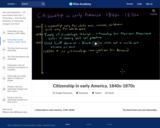
An overview of Citizenship in early America, 1840s-1870s. Created by Kimberly Kutz.
- Subject:
- Political Science
- Social Science
- Material Type:
- Lesson
- Provider:
- Khan Academy
- Provider Set:
- Khan Academy
- Author:
- Kim Kutz
- Date Added:
- 07/16/2021

An overview of Citizenship in early America, 1840s-1870s. Created by Kimberly Kutz.
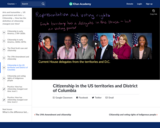
What is the citizenship status of people who live in the US territories and District of Columbia? Created by Kimberly Kutz.

There will always be issues that we disagree with and would like to see changed, but we tend to minimize our role in society. How many times have you thought to yourself, “I’m only one person”? This seminar will explain the important role you play in government. You might not feel like you play an important role, but you do! The “dem” in “democracy” comes from the Greek word demos, meaning “people.” There are many ways that you can be actively engaged in your local, state, and federal government. In this seminar, you will learn about the rights and responsibilities you have as an American citizen and what you can do to help on a small and large scale.StandardsCC.8.6.9.-10.C--Produce clear and coherent writing in which the development, organization, and style are appropriate to task, purpose, and audience.5.2.9.C--Examine political leadership and public service in a republican form of government.5.2.9.D--Analyze citizens’ role in the political process toward the attainment of goals for individual and public good.
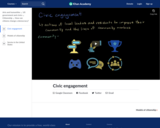
Definition and examples of civic engagement. Created by Kimberly Kutz.
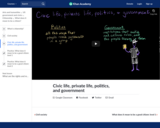
An overview of Civic life, private life, politics, and government. Created by Kimberly Kutz.
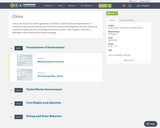
Civics is the study of our national government, constitution, and the rights and responsibilities of citizenship. Topics include democracy and other forms of government; legislative, executive, and judicial functions; the political process; and foreign and domestic policies. It also includes a summary of Washington State History and local native sovereignty.
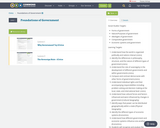
Social Studies Targets:Forms of governmentNature/Purposes of governmentIdeologies of governmentComparative governmentEconomic systems and governmentLearning Targets:Understand how the world is organized politically and nations interact (civics)Identify the differences in philosophy, structure, and the nature of different types of government (civics)Understand the role of sovereignty in the development of different governments and within governments (civics)Compare and contrast democracies with other forms of government.(civics)Understand individual rights and their accompanying responsibilities including problem solving and decision making at the local, state, and international level. (civics)Understand how cultural forces and factors influenced and were influenced by changes in government (Cultural Geography)Identify ways that power can be distributed geographically within a state (Physical Geography)Identify the different types of economic systems (Economics)Understand how different government and economic systems influence one another (Economics)Students will recognize and analyze the ideologies inherent in different economic systems. (Economics)

This lesson explores the topics of Japanese American incarceration and redress, and its relation to the definition of an “American”, rights, and the Census. Definitions of race, nationality, ethnicity, and rights are explained to define “American”. The lesson also explains how Constitutional rights are basic human rights granted to all people regardless of citizenship as well as the differences that benefit an American citizen. To further analyze Japanese incarceration camps, studying the Census will explain its role in carrying out Executive Order 9066 as well as how the laws have changed to protect all Americans. Lastly, students will review the Civil Liberties Act of 1988 to understand how the American government apologized for the treatment of Japanese Americans.
2021 Social Science Standards Integrated with Ethnic Studies:
Civics and Government: 7.5, 8.9, HS.2, HS.6, HS.9, HS.11
Historical Knowledge: 8.25, 8.27, HS.58, HS.60, HS.65, HS.66
Historical Thinking: 8.31, 8.32, HS.67
Social Science Analysis: 7.27, 7.30, 8.33, HS.72, HS.73, HS.74, HS.78
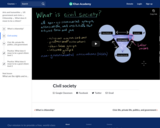
An overview of Civil society. Created by Kimberly Kutz.

In this seminar you will learn about the jobs and responsibilities of community members. You will use the habit of mind remaining open to continuous learning to improve your own community. Then you will create an advertisement to persuade your community members to become more involved!Standards5.2.4.A Identify individual rights and needs and the rights and needs of others in the classroom, school, and community.

The incarceration of Japanese Americans in World War II was a grave failure of our democracy and highlights the dangers that can result when the three branches of government failed to uphold the Constitution, and certain communities are excluded from political power. Until the 1950s, Asian Americans were not allowed to become naturalized citizens and did not have the power to vote or engage in many of America’s political processes. In this lesson, students will investigate how citizenship and voting rights have evolved throughout history and reflect critically on how the rights and privileges conferred by citizenship impact political power on both an individual and community level.
2021 Social Science Standards Integrated with Ethnic Studies:
Civics and Government: 8.2, 8.5, 8.6, 8.7, 8.8, HS.1, HS.2, HS.6, HS.9
Historical Knowledge: HS.53, HS.65
Historical Thinking: 7.25, 8.30, 8.31, HS.67, HS.68
Social Science Analysis: 7.27, 7.29, 8.33, 8.36, HS.72, HS.73, HS.74, HS.77, HS.78
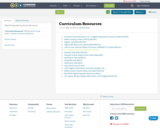
Digital Citizenship Curriculum Resources
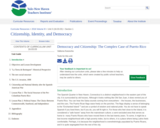
The unit focuses on the struggles for self-identity and self-determination that continue to be problematic even a century after Puerto Rico’s inclusion in the United States’ territory. As a teacher of Spanish and Latin American culture, I find it very appealing that my Puerto Rican heritage students are aware of their roots and I have tried to bring that perception into the unit using a variety of lesson plans to help students understand the political status of Puerto Rico and their rights as citizens of the U.S. In this unit students will be exposed to various topics in the history of the Caribbean islands but with a focus on Puerto Rico. Students will be able to contrast the different historical epochs and their political implications. Finally, using the research as a guide, students will able to evaluate how the outcome of the Spanish-American War changed Puerto Rico’s political status from Spain’s colony to a U.S. territory. After exploring what being a Commonwealth meant for the people of Puerto Rico, they will be able to explain Puerto Rico’s “dual” citizenship and how it affects the Island’s national identity and culture.
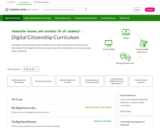
9-12 Digital Citizenship lessons from Common Sense Media. Requires (free) registration
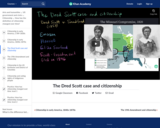
How did the Dred Scott case change citizenship in the United States? Created by Kimberly Kutz.
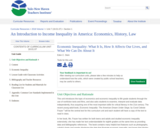
This unit introduces the topic of economics and economic inequality to 8th grade students through the use of nonfiction texts, podcasts, and films, and also asks students to examine, interpret and evaluate data independently, thus acquiring one of the most important skills for critical literacy in the 21st century. The recent young adult book, Economic Inequality: The American Dream Under Siege, by Coral Celeste Frazer is the central text for this curriculum unit and each student will have a copy of the text to read in class. Students study about the American Dream, and economic mobility as well as how these factors have changed over the past 50 years in the United States. Most importantly, students discover exactly what economic inequality consists of, how it impacts our lives, and what can be done about it. In addition to reading text there are classroom debates and the interpretation of political cartoons. As a culminating project, each student chooses a proposed solution to economic inequality for his or her own topic for an argumentative essay. It is hoped that in addition to teaching valuable skills and content that the unit provides a more educated citizenship for the future of our society.
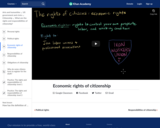
An overview of Economic rights. Created by Kimberly Kutz.
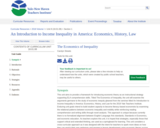
This unit aims to provide a framework for introducing economic theory as an instructional strategy supporting ELA comprehension skills. Titled The Economics of Inequality, the unit will examine the arguments germane to the study of economic inequity gleaned from the seminar titled An Introduction to Income Inequality in America: Economics, History, and Law for the 2018 Yale Teachers Institute. Enduring unit goals intend to build student capacity to become literacy-based economists by examining the relational patterns between economic inequality and mobility while reinforcing reading comprehension and writing skills through novel analysis. This approach is unique because currently there is no formalized alignment between English Language Arts standards, Standards in Economics, and economic education. As teachers explore this unit, it is hoped that strategies, especially those that support critical and extended thinking, are used as a springboard for learning. This unit considers a cross-curricular approach as it was designed with the intent for teachers to spark more ideas on how they can enrich their own pedagogy and engage in lesson development using economic literary across other core subjects. It is also hoped that students’ enduring understandings are made through text-to-self connections by reflecting on how the economy affects their own lives.
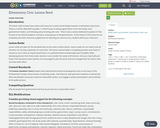
IntroductionThis lesson seed includes lesson plans and resources to assist Social Studies teachers in elementary classrooms. These is a section dedicated to grades 1-3 that focuses on being a good citizen in the community, local governement leaders, and following and promoting safe rules. There is also a section dedicated to grades 4-5 that focuses on the early foundations, functions, and purposes of the governement. At the bottom of the resources is an academic vocabulary word list for key concepts to consider providing visual support to assist you in tailoring your lessons to ELL students within your classroom, along with link to WIDA CAN DO Descriptors.Lesson Seeds:Lesson seeds are ideas for the standards that can be used to build a lesson. Lesson seeds are not meant to be all-inclusive, nor are they substitutes for instruction. This lesson seed provides a compelling question and a bank of sources to use to drive an inquiry based lesson or a potential Evidence Based Argument Set (EBAS). When developing lessons from these seeds, teachers must consider the needs of all learners. Once you have built your lesson from the lesson seed, teachers are encouraged to post the lesson that has emerged from this lesson seed and share with others.

The 12th grade learning experience consists of 7 mostly month-long units aligned to the Common Core State Standards, with available course material for teachers and students easily accessible online. Over the course of the year there is a steady progression in text complexity levels, sophistication of writing tasks, speaking and listening activities, and increased opportunities for independent and collaborative work. Rubrics and student models accompany many writing assignments.Throughout the 12th grade year, in addition to the Common Read texts that the whole class reads together, students each select an Independent Reading book and engage with peers in group Book Talks. Language study is embedded in every 12th grade unit as students use annotation to closely review aspects of each text. Teacher resources provide additional materials to support each unit.